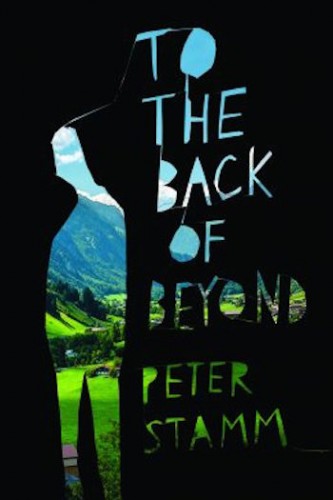Book Review: “To the Back of Beyond” — Extreme Ambiguity
Evidently, plain-spoken language plus doubt and apprehension equate to novels that, once opened, are very hard to put down.
To The Back of Beyond, by Peter Stamm. Translated from the German by Michael Hofmann. Other Press, 140 pages, $15.95.
By Kai Maristed

Two decades ago the now 54-year-old Swiss author Peter Stamm had the talent and good fortune to leap to the center of the literary stage with his fine and troubling first novel, Agnes. Since then, Stamm has published four more novels and two story collections, has been nominated for the Man Booker, and received many major German-language prizes. Agnes is now required reading in German high schools. (It’s a complex, contemporary, and grown-up work. Please take note, all the US AP English classes still Catching in the Rye and Killing Mockingbirds.)
Stamm’s latest offering, gracefully translated by the virtuosic Michael Hoffmann, is titled in English To The Back of Beyond. Here Stamm deploys again, with confidence and dexterity, qualities that have made this writer a favorite of both critics and the reading public. He writes a clean, low-key prose, chary of modifiers, that owes much to his early admiration for the Hemingway of the Michigan stories. The two writers also share a conscious focus on the everyday details of the lives of ordinary people—in the case of To The Back of Beyond, one might say hyper-conscious.
However, in contrast to Hemingway’s journalism-based ‘just the facts, please’ story-telling, Stamm’s short declarative sentences provide an arguably indispensible counterweight to the high degree of ambiguity and uncertainty in his fiction. While the narratives tend on the surface to be straightforward and bare of conventional suspense-building twists and turns, they manage to evoke in the reader a constant questioning, a sense that the ground is not quite firm under the characters’ feet—or ours. ‘Where is this leading? What did really happen? Why? Do we believe these people? Do they believe themselves? Is there another truth?’ It’s a different, deeper, and, for many, more gripping form of tension than thrillers. Evidently, plain-spoken language plus doubt and apprehension equate to novels that, once opened, are very hard to put down. Which is not to say that all of Stamm’s books are equally beguiling.
The narrative premise of To The Back of Beyond is, frankly, a banal set-up: an apparently contented family man—here, Thomas, loving husband of Astrid and father of two young children—walks away from it all without a word of warning or explanation. This happens just after the family has returned from a pleasant seaside summer vacation; it is a September evening; the couple are sipping wine on the bench in the garden of their suburban Swiss home; the boy Konrad calls from inside; Thomas says, leave him be; Astrid, however, goes in. When she returns, her husband is gone.
‘He went out for a pack of cigs and never came back.’ Is it my imagination, or is Stamm acknowledging this old saw, winking to us as he lingers over the cigarette pack that Thomas did bring with him, counting the smokes out to his errant character one by one over the ensuing days?
The story is told in strict alteration from his and her points of view, in shortish bursts of three to five pages. These ‘windows’ into the two lives underscore their rapid divergence, both physically and geographically. However, they allow relatively little light to shine into the interiors of these two souls, especially in the case of Thomas. We and Astrid may be burning to know why he chose to run off, but he never sets the question to himself. He strikes out toward the south, through valleys and rural pastures and eventually Alpine passes, stoically suffering hunger and cold and danger, eventually finding shelter and rough work but moving on whenever a human relationship threatens to bud. His strong and only desires are to keep moving, to stay under the radar, to not be caught and brought back. At the same time, his thoughts of Astrid are fond and comforting. “It was at moments of uncertainty, of crisis and quarrel, but also of sexual passion that he felt closest to her, and their love seemed to him as strong now as in the first months of their relationship. He wondered how long she would manage to keep the illusion going before she collapsed.” Thomas senses his loved ones in confusion, waiting for him; he pictures the mundane gestures of their days and nights, now shorn of meaning, but feels no iota of remorse, no responsibility. Is Thomas not his own master? Or is he his own master for the first time? Doubt. Ambiguity. Uncertainty.
Meanwhile, back at the Haeusli, Astrid is, if anything, in an even more trancelike state. As early days go by she passes through stages that resemble grief over a death. Denial at first—he’s on a business trip, she tells the kids, then calls him in sick to the office. But not long thereafter: “…suddenly she felt convinced that Thomas wouldn’t be there for dinner [that night] or tomorrow. The feeling took her breath away, not concern but a crippling fear as though she already knew what would happen.” For a time she’s literally paralyzed, balled up in bed. Eventually she turns to the police, and there ensues a vague flirtation with the young, sympathetic, married officer. Stamm conveys well the complexity of this attraction—gratitude to the bringer of hope, the relief of a shoulder to cry on, the need to feel one’s self attractive after monstrous, inexplicable rejection.

Author Peter Stamm — He writes a clean, low-key prose, chary of modifiers, that owes much to his early admiration for the Hemingway of the Michigan stories. Photo: Claudia Below.
Paradoxically, the quickly alternating points of view also serve to underscore the ‘coupledness’ and almost eerie continuing bond between the two. Even as weeks and months go by, they frequently imagine one another’s ongoing experiences with an uncanny near accuracy, as through a glass darkly. Astrid leads a ‘double life’, going through the daily motions while imagining or dreaming of sleeping with Thomas at night. Other clues, if you will, to Stamm’s purpose in creating Thomas and Astrid are scattered throughout. They include their having read together, early on, Erich Fromm’s The Art of Loving. “Thomas would have liked to think that mature love wasn’t based on sex, and that it wasn’t love for a single being, but for the whole world, but everything in him was at odds with the views of the distinguished psychologist. You love what you take trouble over, and you take trouble over what you love, said Astrid, and to him that was like a secret message he wasn’t sure he understood.”
Well, plainly he did not, if taking trouble requires being present. To the Back of Beyond has an unusual chronological shape. Time moves far more slowly for Thomas than for Astrid. And while the first days and weeks of Thomas’s absence take up more than half the book, time accelerates as he winters near the Gotthard pass. There he finally reaches the top of the world, where harrowing and in this material world mutually exclusive events will take place. After that high point, so to speak, time for both hurtles at jet-speed. In the last few pages the children grow up, Thomas reaches retirement age, Astrid in her double life neither remarries nor goes back to work.
The unquestioning Thomas is the ostensible enigma here. But Astrid poses a puzzle of her own. Why is she utterly accepting of her man’s cruel behavior, although at one point seeking the fault in herself? Wouldn’t a real woman at least find friendships, return to her congenial work as a bookseller, even if she doesn’t want another mate? Astrid’s passive acceptance is distancing, even invalidating; despite her erotic memories she seems more symbol than flesh and blood. This, added to the deliberate lack of resolution with which the book ends, diminishes an otherwise closely observed and engrossing novel. The reader eager to discover Peter Stamm might do worse than start with Agnes.
Kai Maristed studied political philosophy in Germany, and now lives in Paris and Massachusetts. She has reviewed for the Los Angeles Times, the New York Times, and other papers. Her books include the short story collection Belong to Me, and Broken Ground, set in Berlin. Recent pieces are The Toubaab, in Consequence, and Tyger, Tyger in the Southwest Review. Read Kai’s Paris-centric take on politics and the arts here.
Tagged: fiction, german, Kai Maristed, Michael Hofmann, Other Press, Peter Stamm, To the Back of Beyond
